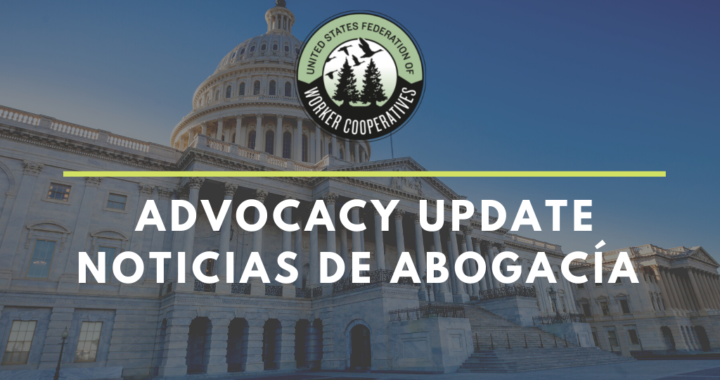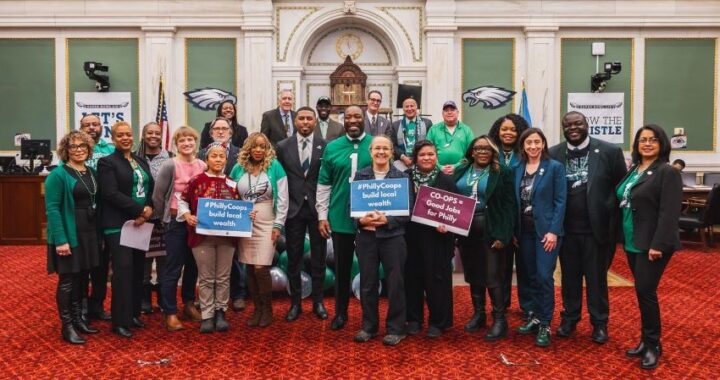
The USFWC applauds Representative Ro Khanna (D-CA-17), Rep. Jamaal Bowman (D-NY-16), and Rashida Tlaib (D-MI-12) on the introduction of the National Worker Cooperative Development and Support Act (HR 7721), which aims to promote and expand worker-owned cooperative businesses in the United States by endowing the Small Business Administration (SBA), Internal Revenue Service (IRS), Department of the Treasury, Department of Commerce, United States Department of Agriculture (USDA), and Department of Labor (DOL) with responsibilities and authorities to implement programs and initiatives to support worker co-ops.
These include reviewing regulations and proposing revisions to remove barriers preventing the wide-adoption of the worker co-op model nationwide by facilitating access to capital, providing education/outreach/technical assistance, and conducting research on worker co-ops.
This bill has been developed and stewarded for many years by the USFWC, DAWI, and so many of its members through its Policy and Advocacy Member Council. Thanks to the continued support from Rep. Khanna, the National Worker Cooperative Development and Support Act will be a launch pad for worker co-ops in the United States. We hope to see it refined and supported by representatives on both sides of the aisle, along with other the worker ownership legislation that has seen a resurgence since 2018.
In addition, the bill establishes a United States Council on Worker Cooperatives within the Department of Labor. This interagency council will coordinate federal efforts relating to worker co-ops, develop a federal strategy to incorporate worker co-ops into economic development, identify regulatory barriers, propose solutions, coordinate research and data availability, coordinate educational initiatives, and report to Congress on progress and recommendations.
Finally, the bill creates a small business lending pilot program through the SBA specifically for worker-owned cooperatives, providing $60 million in loans over 10 years and provides funding through the Community Development Financial Institutions Fund for education and services to establish and manage worker co-ops.
In summary, the bill aims to significantly expand worker co-op development across the country through coordinated federal support in areas like access to capital, technical assistance, research, and regulatory changes. This represents a major policy promotion of the worker co-op model for this rapidly growing sector which has been historically underserved.
“The inspiration behind this legislation comes from seeing the positive impacts that worker cooperatives are having in communities across this country. Worker-owned businesses empower employees to have a voice in their workplace and share in the company’s success. They promote more equitable distributions of wealth and anchor jobs locally. In my own district in Silicon Valley, I’ve had the chance to visit worker cooperatives ranging from a home care agency to a pizza shop to a brewery to a bakery. Seeing firsthand how employee ownership transforms people’s lives and livelihoods made me want to help spread this business model. As our nation confronts rising inequality and workforce displacement from automation, we need bottom-up economic models that give workers ownership stakes.
With the coming ‘Silver Tsunami’ retirement wave, we have a huge opportunity over the next decade to convert many existing small businesses into worker cooperatives. This bill provides coordinated federal support and resources to make that possible. I believe widespread worker ownership is not only good policy, but also fully aligned with American values of liberty, democracy, and fair opportunity. My hope is this legislation seeds an ownership economy that lives up to those ideals.”
– Representative Ro Khanna (CA)
View this post on Instagram
“The worker cooperative model has incredible potential to build wealth in local communities around the country — and to strengthen our democracy in the process. But to realize that potential, this budding sector needs the federal support and financing that this bill provides. I’m proud to have championed worker co-ops federally, including in my amendments to the CHIPS and Science Act, and in my district, in partnership with leaders like Cooperative Home Care Associates. I couldn’t be more excited to partner with Rep. Khanna to get this game-changing piece of legislation passed”
– Rep. Jamaal Bowman, Ed.D.

USFWC Board, staff, and friends celebrating the introduction of the National Worker Co-op Development and Support Act
As a generation of owners retire in the coming years, the U.S. is facing a small business crisis. The National Worker Co-op Development and Support Act is a vital solution to ensure businesses stay open, jobs are saved, and our economy is strengthened. We applaud Rep. Ro Khanna and Rep. Jamaal Bowman as they stands up for small business through the National Worker Cooperative Development and Support Act, which will build wealth for workers and give them a stronger voice in the workplace. This bill shines a light on the highly underserved sector of worker cooperatives, a business model that is proven to be resilient and to strengthen communities. We look forward to seeing its benefits for decades to come.
– Esteban Kelly, U.S. Federation of Worker Cooperatives
“Worker Cooperatives are a solution for business owners who want to retire, for community stability, and for worker empowerment…and of course wealth building. There are significant issues around the lack of understanding and awareness of what a worker cooperative is, how a business can transition to one, and the business needs. Thank you Rep. Ro Khanna for bringing the conversation of worker cooperatives to the front burner and prioritizing their creation and treatment at the federal level”
– Kirk Vartan, A Slice of New York (a worker co-op in Silicon Valley)
“Decades of research have shown that employee ownership creates good jobs, strong businesses and a meaningful pathway for wealth creation through business ownership for hundreds of thousands of workers. The National Worker Cooperative Development and Support Act will remove major obstacles that inhibit the wider adoption of worker ownership as a critical tool for equitable economic and workforce development,” – Zen Trenholm, Senior Director of Employee Ownership Cities and Policy at the Democracy at Work Institute.”
– Zen Trenholm, Democracy at Work Institute
What does the bill do?
- Directs specific federal agencies (SBA, IRS, Treasury, Commerce, USDA, DOL) to implement programs supporting worker cooperatives. Requires them to review regulations and propose revisions to remove barriers, facilitate access to capital, provide education/outreach/technical assistance, conduct research, and coordinate with the interagency council created by the bill.
- Directs the Small Business Administration to develop worker cooperative educational materials accessible online and in multiple languages. Also directs SBA to do outreach in communities where English is not the primary language.
- Establishes an interagency United States Council on Worker Cooperatives within the DOL, which is currently launching a Division of Employee Ownership. Designates the Secretary of Labor as chair. Outlines council membership from federal agencies. Tasks the council with developing a federal worker cooperative strategy, identifying regulatory barriers, proposing solutions, coordinating research/data availability, coordinating educational initiatives, and reporting to Congress on progress. Council sunsets after 10 years.
- Creates a 10-year, $60 million Small Business Administration lending pilot program specifically for worker cooperatives.
- Provides funding through the Community Development Financial Institutions Fund for education and services to establish and manage worker cooperatives.
- Defines “worker-owned cooperative business” as majority owned/controlled by employees, either through organization under state cooperative law or meeting IRS eligibility criteria.
Stay tuned for more information as this bill develops, and we continue to advocate for its passage. Interested in digging in more to advocacy work at the USFWC? Become a member and join our Policy and Advocacy Council calls on the first Thursday of each month, or email policy@usworker.coop.

